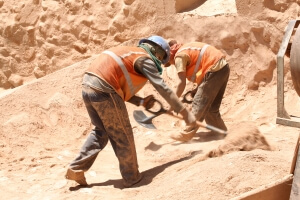 The gold mining industry in Tanzania is looking to make a revolution with the help of the initiative Fairtrade International. The idea was recently announced and is going to impact 12 mines in Tanzania, Uganda and Kenya, creating the first batch of African ethical gold within a year.
The gold mining industry in Tanzania is looking to make a revolution with the help of the initiative Fairtrade International. The idea was recently announced and is going to impact 12 mines in Tanzania, Uganda and Kenya, creating the first batch of African ethical gold within a year.
The goal is to put an end to the scourge of mercury poisoning that affects an unknown number of Tanzanians working in small-scale mining, causing memory problems, sickness and impaired vision. Tanzania is Africa’s fourth largest gold producer with almost 15 million people working in mines, most of them illegal and unlicensed. These mines produce 200 to 300 tonnes of ore a year, but that means that most miners have to endure 24-hour shifts without following basic safety rules.
Many of these miners are women who work on the surface crushing the ore, while simultaneously holding babies or small children. In some mines, cyanide is used to separate the gold from other minerals, creating another source of danger both to humans and to the environment. And child labour is another concern, according to a report released by the organization Human Rights Watch.
According to Harriet Lamb, director of Fairtrade International:
Fairtrade is not something where you can click your fingers and magically start paying farmers and miners, but they have started to tackle the problems. It’s a long process of change and we are under no illusions. But having seen the conditions of the miners it has only steeled my determination to make this work. It is shocking that people finding gold — a precious metal so valued — are working in such terrible conditions.
However, the Fairtrade International initiative might bring change, through its three-year scheme funded by the institution Comic Relief. With this new plan, working practices might start start improving by banning child exploration, enforcing health and safety rules and preventing massive toxic poisoning. The goal is to get European buyers interested in the idea of “green gold”.
They will pay more, of course, but the return is amazing: a fairer price for the ore and a Fairtrade premium that can be invested in local mines, education, childcare and community groups. The first signs of change are being noticed at the Tanzanian Ilani mine, near Nyarugusu: the mine known as Golden Hainga has already barred children and runs a daycare for the workers’ children. Open burning of mercury has been banned and personal protection equipment is mandatory.
Some workers and mine owners have provided testimonies to The Guardian:
The main difference between other mines is health and safety. It’s the first time I’ve had a helmet — in other mines we had no helmets, or gloves or boots.
Lufta Weja, Golden Hainga worker
My dream is to be able to use the technology that was used in Tanzania 50 years ago. But we thank God for Fairtade because it has lifted us from one level to another. We have put in wooden steps to get to the bottom of the mine. We no longer burn mercury in the open and we ensure that waste water from the mine doesn’t contaminate the environment.
Renatus Nsangano, mine owner
To achieve Fairtrade certification, African gold mines will have to ban mercury burning in the open and ensure there’s no child labour in the pits, among other details.
The success of the initiative was seen previously in South America, which began to sell Fairtrade gold two years ago. As well as fair working conditions and payment, the miners also get a Fairtrade premium per kilo of fine gold, which has to be invested into the local community.
